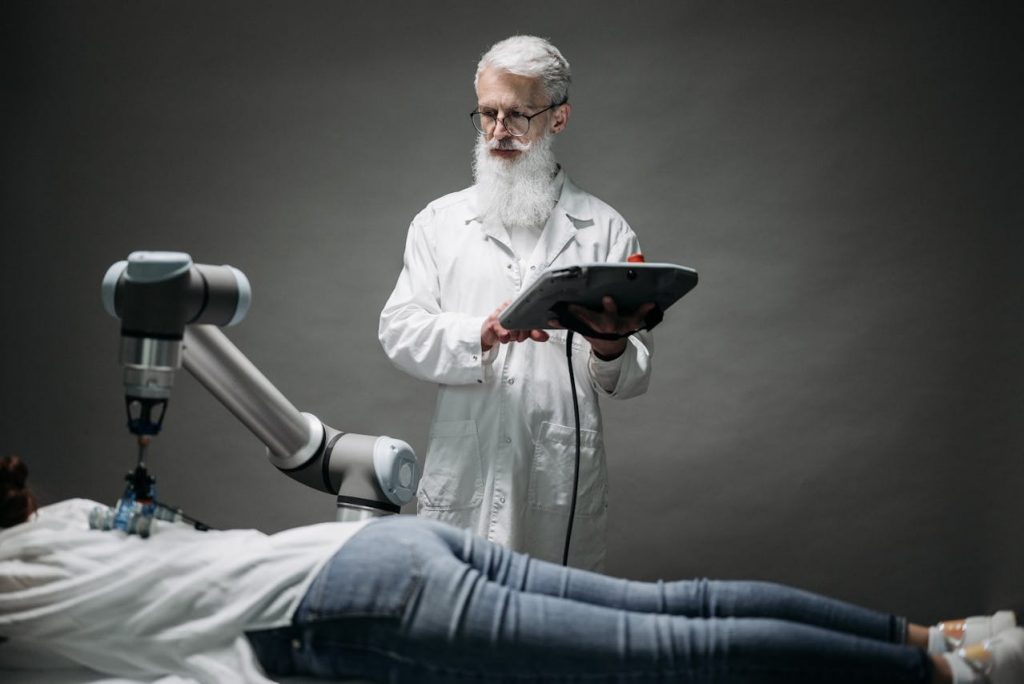Rapid artificial intelligence (AI) breakthroughs have significantly impacted the healthcare sector. AI is transforming patient care, diagnostics, drug discovery, and other fields...

Image Credits: pexels
Rapid artificial intelligence (AI) breakthroughs have significantly impacted the healthcare sector. AI is transforming patient care, diagnostics, drug discovery, and other fields thanks to its capacity to handle and learn from enormous volumes of data. This blog explores how AI transforms the healthcare industry, harnessing its potential to improve patient outcomes and streamline healthcare operations.
AI-powered diagnostic tools are empowering healthcare professionals to make accurate and timely diagnoses. According to a study published in Nature, AI algorithms achieved a diagnostic accuracy of 94.5% in detecting certain diseases, surpassing human performance. The effectiveness of treatment can be greatly enhanced by using these technologies to help in the early detection of diseases like cancer, heart disease, and neurological disorders.
AI makes personalized therapy possible by analyzing vast patient data, such as genetic information, medical records, and lifestyle choices. With this knowledge, AI algorithms can predict a patient’s response to specific treatments and medications, optimizing therapy plans. A study conducted by Stanford University found that AI-guided treatment recommendations improved the effectiveness of cancer treatments by 30% compared to traditional methods.
AI is changing healthcare operations by automating repetitive jobs and improving administrative procedures. Intelligent chatbots and virtual assistants can answer patient questions, set up appointments, and give out the fundamentals of medicine. Healthcare industry operations reduce the burden on healthcare staff and enhance the patient experience. Additionally, AI-powered predictive analytics can optimize hospital workflows, resource allocation, and inventory management, leading to cost savings and improved efficiency.
Developing and testing new medicines is an expensive and time-consuming procedure. Conversely, AI speeds up this procedure by looking through a tonne of biomedical data to find possible therapeutic candidates. AI algorithms can quickly screen and analyze molecular structures, predict drug efficacy, and assess potential side effects. A recent report from Deloitte found that AI-based drug discovery reduced the time and cost of developing new drugs by up to 70%.

AI-powered wearable devices and remote monitoring systems transform patient care beyond traditional healthcare settings. These devices are capable of real-time monitoring of vital signs, detection of abnormalities, and alerting of healthcare providers. Patient monitoring and remote care enable early intervention and proactive care and reduce the need for hospital readmissions. According to a study published in The Lancet, AI-driven remote monitoring reduced hospital readmission rates by 45% for heart failure patients.
AI is revolutionizing medical research and clinical trials by accelerating data analysis and improving trial design. Large datasets can contain patterns and correlations that AI systems can find, revealing insights that might otherwise go undetected. This type of medical research speeds up the research process and aids in discovering new treatments and therapies. Moreover, AI-powered virtual clinical trials offer the potential for more diverse and inclusive participation, enhancing the generalizability of study results.
Addressing privacy and ethical concerns is crucial as AI becomes more prevalent in the healthcare industry. Safeguarding patient data, ensuring algorithm transparency, and maintaining ethical AI practices are paramount. Striking a balance between innovation and patient trust is essential to harness AI’s potential in healthcare fully.
AI is changing the face of healthcare, from advancing diagnostics and personalized therapy to streamlining processes and revolutionizing drug discovery. The healthcare sector can improve patient care, improve treatment results, and advance medical research using AI.
We must carefully address privacy and ethical issues to achieve a responsible and advantageous implementation. AI can transform healthcare and enhance the lives of countless people worldwide with further development.
Suggested:
AI in Healthcare – The Paradigm Shift with Google Lens Dermatology.